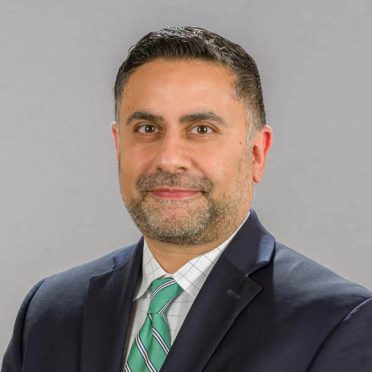In the first overview of its kind, an Institute of Living leader published research into the role implicit bias plays in collaboration between healthcare professionals.
The article, “Exploring Implicit Influences on Interprofessional Collaboration: A Scoping Review,” was published ahead of print in the Journal of Interprofessional Care. Javeed Sukhera, MD, PhD, FRCPC, chair of psychiatry at the IOL and chief of psychiatry at Hartford Hospital, was lead author.
“We know there are multiple tensions that can influence team performance, especially in healthcare,” Dr. Sukhera said. “We also know that implicit biases can influence team functions such as communication and trust, ultimately affecting quality of care. That’s why our research sought out to understand how bias might influence team collaboration at multiple levels.”
The researchers mined online databases for 159 articles, from which they extracted and analyzed data demonstrating how team members internalized bias about dominance and expertise, negatively influencing collaboration. Their findings are the first comprehensive review of how biases, such as those related to race, age and gender, influence interprofessional collaboration in healthcare.
“We found team members internalized certain biases about their profession and the way they perceived them influenced their attitudes and behavior toward themselves and others,” he said. “This hindered meaningful, equitable collaboration. In response to internalization, team members frequently adapted how they collaborated with one another in a manner that reflected larger power structures and organizational hierarchy.”
Internalization, Dr. Sukhera said, is easy to dismiss in the workplace while adaptation triggers external action or behavior change. The behavior of others conditions some healthcare professionals to view themselves as having certain attributes or expertise.
“Learning how personal and professional identity influences collaboration is essential to inform how we build the health system of the future,” he said. “If a team member perceives themselves as powerless or lacking authority, they tend to check out and become disengaged. Fostering a sense of belonging for all individuals is essential for high-functioning teams.”
Sarah Lewis, Vice President of Health Equity for Hartford HealthCare, said the research contributes “to our shared understanding of how bias, explicitly and implicitly, influences the human experience in healthcare settings.”
Work already underway at the system benefits from understanding the impact of bias, she said.
“This research points us in the direction of the interplay between colleague well-being, belonging and psychological safety,” Lewis said. “Improving our system’s ability to succeed along all three of these dimensions can positively influence how we care for our patients, and how we show up in the communities we serve.”
Leadership, both Dr. Sukhera and Lewis said, also plays a role in understanding biases and collaboration.
“Inclusive leaders who promote shared models of leadership are key to optimal teams,” Dr. Sukhera said.
Comprised of “diverse, dynamic teams,” HHC’s success, Lewis added, “depends on our ability to bring everyone’s voice to the table, and that requires an inclusive environment fostered by inclusive leaders.
“All potential implications for the research around this subject are significant,” she said. “Being an inclusive leader, and having the ability to understand and mitigate biases are not skills traditionally expected of healthcare leaders. I think what we are learning is that, going forward, they must be. The health and well-being of our workforce and our patients depends on it.”
Interestingly, Dr. Sukhera’s research also uncovered the tendency of healthcare team members who see themselves as less dominant – social workers in one case – to align with those they perceive to be more dominant to buffer their internalized biases and increase their influence.
These findings, he said, should help promote future research on bias and belonging in healthcare.
“We know bias can adversely influence healthcare quality. We hope this will catalyze further research on how bias, privilege and power intersect between and among different health professions,” he said.
At HHC, Lewis said part of the commitment to creating a culture of equality and inclusion meant introducing courses – both live/virtual and self-paced online – to leaders and managers across the system. In addition, over the past year, all colleagues were granted access to an introductory course on how to identify biases and microaggressions.



